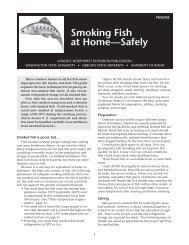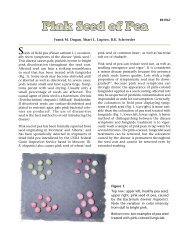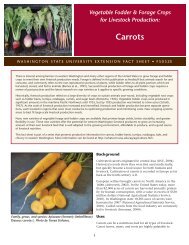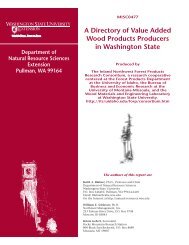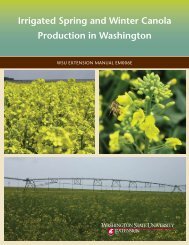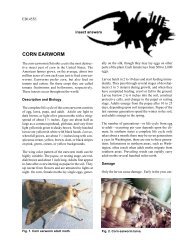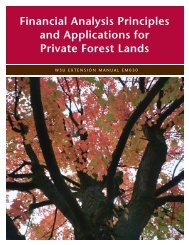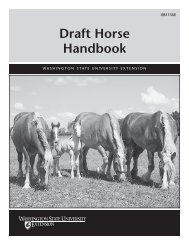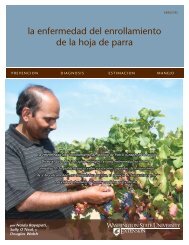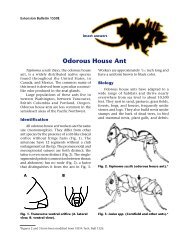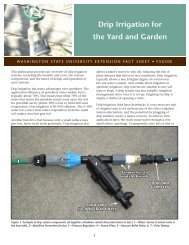Em4885 irrigation management practices to protect ground water
Em4885 irrigation management practices to protect ground water
Em4885 irrigation management practices to protect ground water
Create successful ePaper yourself
Turn your PDF publications into a flip-book with our unique Google optimized e-Paper software.
Reacting <strong>to</strong> Pollution - The Compliance Memorandum of Agreement<br />
5<br />
CHAPTER 6<br />
The government agencies discussed above are by nature active. That is, their primary function<br />
is development and dissemination of knowledge, or assistance in applying that knowledge, so as <strong>to</strong><br />
prevent and/or reduce potential pollution. However, they are also involved in reacting <strong>to</strong> existing<br />
pollution.<br />
Some of the responsibilities of Conservation Districts, Department of Ecology (Ecology), and<br />
Washing<strong>to</strong>n State Conservation Commission (Commission) regarding <strong>water</strong> quality <strong>protect</strong>ion are<br />
described in the Compliance Memorandum of Agreement. This document has been voluntarily<br />
entered in<strong>to</strong> by most Conservation Districts in Washing<strong>to</strong>n, Ecology, and the Commission. This<br />
Agreement basically describes the working relationships between the three entities in order <strong>to</strong> carry<br />
out a program of agricultural <strong>water</strong> quality <strong>protect</strong>ion and <strong>management</strong>. Specifically, the Agreement<br />
describes how <strong>water</strong> quality violations can be handled at the District level.<br />
By entering in<strong>to</strong> the Agreement the Department of Ecology agrees <strong>to</strong>, among other things:<br />
A. Identify existing and potential <strong>water</strong> quality problems resulting from<br />
agricultural <strong>practices</strong>.<br />
B. Receive, process, and verify complaints concerning discharges of pollutants<br />
from all farms, regardless of size.<br />
C. Determine if an agricultural <strong>water</strong> quality problem requires immediate corrective<br />
action . . . . If so, then Ecology will maintain the lead enforcement authority. If<br />
immediate action is not required and a District has agreed <strong>to</strong> Compliance Levels 3<br />
or 4 (explained below) then the complaint will be referred <strong>to</strong> the District.<br />
Otherwise, Ecology will continue <strong>to</strong> process the complaint.<br />
In turn, the Conservation Districts agree <strong>to</strong>:<br />
A. Adopt and annually update a <strong>water</strong> quality section in the Conservation District<br />
annual plan.<br />
B. As part of the District annual report, include a <strong>water</strong> quality progress report<br />
on activities conducted that are related <strong>to</strong> this compliance agreement.<br />
C. Encourage communication between the Conservation District personnel and<br />
local Ecology personnel.<br />
D. Adopt and carry out a compliance option of Level 1, Level 2, Level 3, or Level 4.





